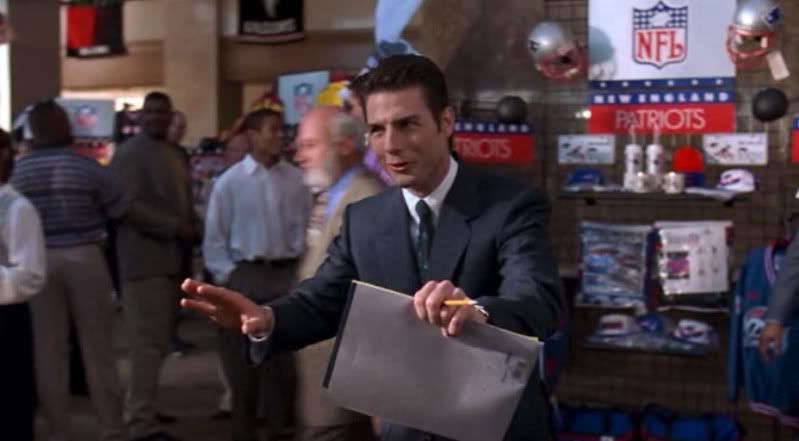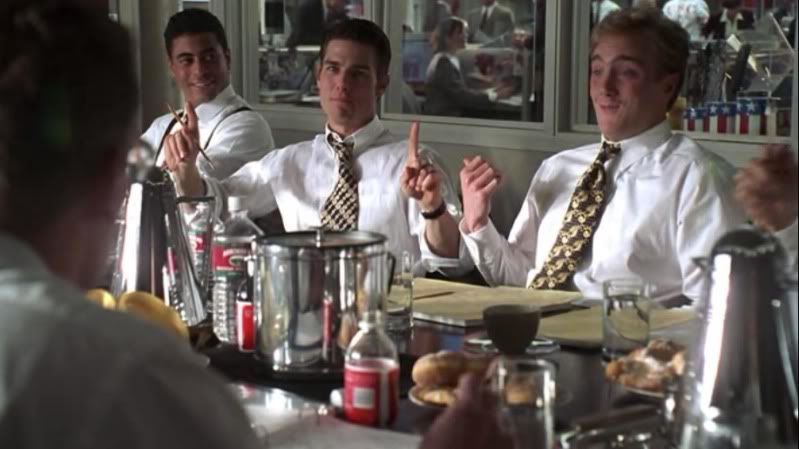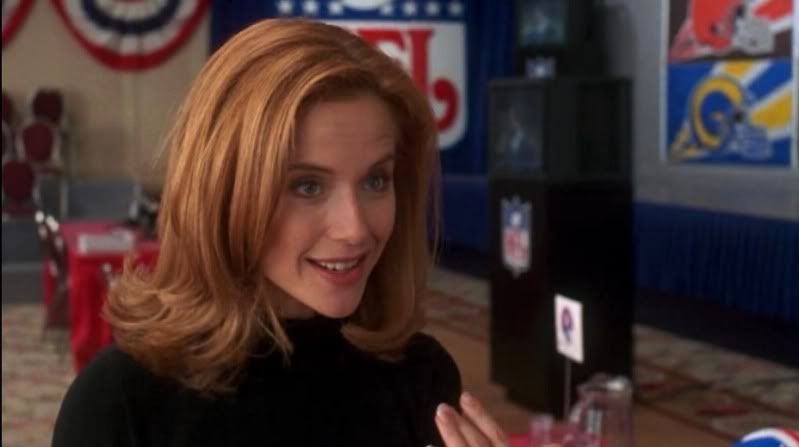
When reading the text 'Romantic Comedy: Boy Meets Girl Meets Genre' (McDonald), I had a lot of fun comparing the recent viewing of the film 'Jerry Maguire' with the typical expectations of the genre "romantic comedy". It was refreshing to know that amidst reading about the potential materialistic, commercialized, recycled and predictable stereotypes of the genre, at least one flick could stand alone as rejecting strict categorization while honoring type.
At first brief glance, 'Jerry Maguire' could be perceived as a masculine movie. After all, it's about football, football stars, and the politics of sports. This aspect allows strong accessibility to what might be considered typical male audiences.

Jerry networking with the sports stars

Jerry being a rock star at the company meeting
When most audiences see a romantic comedy, they expect "stories from the perspective of their female lead character...privileging her within the film as the site of audience identification." (p. 16) The point of view in 'Jerry Maguire' is completely male-oriented. Yet once we're allowed into the actual plot of the movie, it's discovered that the movie is really about is "boy meets, loses, regains girl" (Shumway p. 12), the pinnacle structure in the girl's club genre of rom-coms.
There are other notable romantic comedy staples in 'Jerry Maguire'. In 'Romantic Comedy', the concept of 'meet cute' is explained to be a frequent device in classic romantic comedies like the films of Billy Wilder (p. 12). 'Meet cute' is when the destined couple share a moment upon meeting that symbolically represents their eventual union. Jerry (Tom Cruise) and his love interest, Dorothy (Renee Zellweger), share a moment like this and more so.

Jerry and Dorothy "meeting cute"
Having just met, Jerry and Dorothy join hands with her son and swing him playfully back and forth as they have a casual chat. It is not just that their moment immediately comfortable. 'Jerry Maguire' manages to incorporate the theme of single mothers and the children's incorporation into romantic comedy with one perfectly symbolic moment.
Of course, it is not just the recurrence of rom-com stereotypes that make it a notable film. 'Jerry Maguire' also finds a unique way to use the genre to explore the spectrum of female identity. Both of Jerry's romantic interests represent parts of the "strong woman" spectrum.

Avery Bishop (Kelly Preston) is Jerry's fiance, a fast-paced, career-oriented, sexually aggressive woman who knows what she wants yet won't shed a single tear to sacrifice it.

Dorothy Boyd is the frazzled single mother secretary who pines for Jerry from afar and follows him into a blind alley when he gets fired.
But these first impression descriptions contradict the strengths and weaknesses of their underlying character. Avery is strong-willed and motivated, but it's at the expense of her sensitivity, as seen in the moment when she harshly criticizes Jerry for trusting a man's word over a contract. Jerry absorbs her scorn, and when asked for loyalty, she replies that "...There is a sensitivity thing that some people have. I don't have it."
This sort of strength is misplaced, and seems to denounce all the wonderful traits that are associated with femininity- like caring, nurturing sensitivity. Dorothy, on the other hand, seems to overcompensate with sensitivity, questionably to a self-detriment. She is willing to sacrifice her job to help Jerry Maguire. But this doesn't necessarily make her a passive follower. She was willing to sacrifice her material, earthly possessions, but not the genuine love that breeds mutual caring and nurture. When it came to defending Jerry, like ensuring the representation of football star Rod Tidwell (Cuba Gooding Jr.), she was ready to pounce, defending his potential agency and philosophies vehemently. But she would not stand for being neglected when Jerry became distant and absent from their relationship. This could arguably make Dorothy the "true" modern woman, having it all, emotionally and psychologically, while raising a child by herself.
Children play such a vital part of the plot that it would be a shame not to acknowledge their influence on the world of the film. For me, this aspect conjures Simone de Beauvoir, and her sentiments that "The division of the sexes is a biological fact...The couple is a fundamental unity with its two halves riveted together, and the cleavage of society along the line of sex is impossible. Here is to be found the basic trait of woman: she is the Other in a totality of which the two components are necessary to one another." (Woman as Other, Intro) Here, in 1949, she is unveiling the truth that it would be biologically impossible for woman to escape sexism on an island away from men the way that say, blacks could escape racism by isolating whites without risking extinction. But at its best, the modern rom-com 'Jerry Maguire' was able to create a balanced relationship that took advantage of biological reliance while still being loyal and sensitive to both sexes mutual emotion reliance. Certainly this also upholds the romantic comedy's seeming #1 priority, perpetuation of the species.

No comments:
Post a Comment